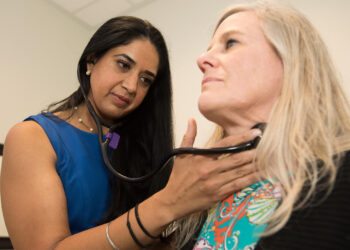
Our happiness levels are not constant throughout our lives
Ippei & Janine Photography/Getty Images
The commonly held belief that happiness follows a U-shaped curve – with peaks at the beginning and end of life – might be incorrect.
The pattern was popularised in a seminal paper by researchers David Blanchflower and Andrew Oswald in 2008, based on data from half a million people. Since then, it has been held as a common belief and has even been the subject of mainstream books.
But Fabian Kratz and Josef Brüderl – both at the Ludwig Maximilian University of Munich in Germany – posit that this belief may be wrong.
Kratz says he was motivated to revisit the claim “because [the U-curve] did not reflect my personal experiences with older people”. So the pair looked at self-reported happiness statistics for 70,922 adults who took part in the annual socio-economic panel survey in Germany between 1984 and 2017. They then modelled how happiness changed within each person’s life.
Rather than forming a U-shaped curve, they found that happiness generally declines slowly throughout adulthood until people’s late 50s, when it begins to tick upwards until 64, then drops dramatically.
One of the reasons Kratz believes previous studies have come to what he sees as incorrect conclusions is that they oversimplify the trajectory of happiness, partly by ignoring deaths brought about by suicide or ill health. “You get the impression that after a certain age, happiness would increase only because the unhappy people are already dead,” says Kratz.
“There’s been a lot of debate in the social sciences about non-replicable findings – results that disappear when new data are collected,” says Julia Rohrer at the University of Leipzig. “But there’s another, less appreciated issue: researchers sometimes analyse their data in systematically flawed ways. This can produce results that replicate reliably, yet are still misleading.”
Others say the results prompt a new set of questions. “This paper is great for thinking about what we’re really trying to know in research,” says Philip Cohen at the University of Maryland, but he points out we should now try to learn why happiness changes throughout life and if the troughs can be avoided. Kratz and Brüderl themselves are keen to avoid speculating on why the changes they observed occur.
Oswald says the paper “has interesting results and all research should be welcomed”, but he adds that the pair didn’t control for factors such as marriage and income, which may influence happiness.
He also points out that the study only looked at one country, so we don’t know if the results apply elsewhere. Kratz says this would be an interesting avenue for future research, particularly as the findings could have implications for policy. “Previous scholars argued that we need affirmative action policies to help individuals cope with their midlife crisis,” says Kratz. “I do not want to say that this is not urgent, but our results suggest that the most urgent issue is to address happiness decline in old age.”
Need a listening ear? UK Samaritans: 116123 (samaritans.org); US Suicide & Crisis Lifeline: 988 (988lifeline.org). Visit bit.ly/SuicideHelplines for services in other countries.
Source link : https://www.newscientist.com/article/2498760-your-happiness-in-life-may-not-be-u-shaped-heres-how-it-could-vary/?utm_campaign=RSS%7CNSNS&utm_source=NSNS&utm_medium=RSS&utm_content=home
Author :
Publish date : 2025-10-03 16:54:00
Copyright for syndicated content belongs to the linked Source.













